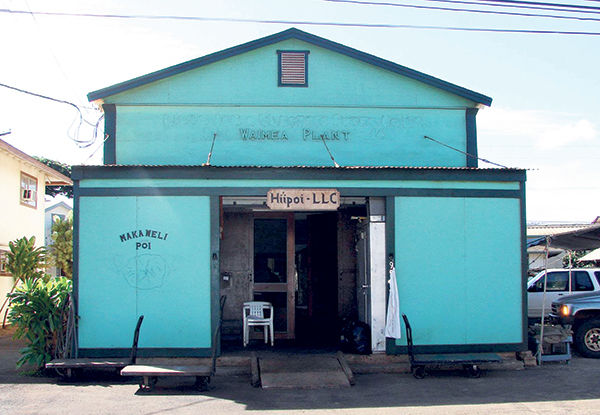Tom LaVenture The Garden Island LIHUE — A Westside company is suing the Office of Hawaiian Affairs for breach of contract and fraud in its operation of the former Makaweli Poi Mill that it purchased and operated from 2008 until
Tom LaVenture
The Garden Island
LIHUE — A Westside company is suing the Office of Hawaiian Affairs for breach of contract and fraud in its operation of the former Makaweli Poi Mill that it purchased and operated from 2008 until it ceased operations in 2012.
The suit, filed by Lihue attorney J. Scott Kessinger on Dec. 31, claims that OHA failed to follow through on a binding agreement to transfer the Makaweli Poi Mill (MPM) to Ka Piko O Waimea, and instead turned it over to Lehua Poi Company that used the facilities for other products and did not purchase taro from Kauai farmers, but from a produce supply company that obtains taro from other islands.
The suit also charges OHA with violating the state constitution for failing in its duty to preserve and enforce traditional rights exercised by descendants of Native Hawaiians for subsistence, cultural and religious purposes during its period of ownership.
The complaint states that the transfer of MPM to Lehua Poi Company in 2013, without first assessing potential damage that could occur, essentially violated state laws regarding OHA’s mission to preserve traditional rights exercised by descendants of Native Hawaiians for subsistence, cultural and religious purposes.
A press release from Ka Piko, a nonprofit listing Bryna Storch as executive director and operations manager, stated that the suit is in the best interests to remedy a major cultural loss to the community and taro farmers of West Kauai. Ka Piko names OHA and CEO Kamanaopono Crabbe, its programs Hiilei Aloha and Hiipoi, and CEO Mona Bernardino as defendants.
Makaweli Poi Mill was a longstanding cultural practice in Waimea, and provided poi to the community from local taro farmers. It used traditional milling techniques with generations of experience and operated profitably until the OHA purchase in 2008.
Former MPM owner John Aana and the OHA representative on the State Taro Task Force had supported the Ka Piko transfer. Aana had run a profit since 1992 until the sale to OHA in 2008.
Under state law, the OHA mission is to seek the betterment of conditions for Hawaiians, and may include projects that use taro for flood control, wetland restoration and preservation, food security, community economic development, job creation, education and water-quality protection.
OHA formed Hiilei in 2007 as a nonprofit to preserve Waimea Valley taro and poi business and associated cultural opportunities in Makaweli. It formed Hiipoi in 2008 as a nonprofit producer of poi and taro-related products.
In 2007, the OHA Board of Trustees approved the $185,000 purchase of Makaweli Poi Mill. A business plan was developed for a profitable business that supports a local farmer cooperative while continuing cultural awareness.
The plans never materialized in terms of resources, the complaint stated. Ka Piko claims OHA failed to support farmers in flood years and did not adjust budget projections to account for decreased supply.
Hiipoi received $369,448 in grants and assistance from OHA and Hilllei including no-interest loans for operations that were forgiven.
Despite additional revenue and substantial increases in sales of poi at Makaweli, Hiipoi operated at a loss from 2008 through 2011, with $200,176 worth of discrepancies in reporting expenses.
Funds were used for extravagant expenditures not related to the mission or business plan, according to the complaint. A purchase of a dedicated van and driver for use on Oahu was one example, with excessive outside accounting agreements and travel expenditures. In addition, Hiipoi and Hilllei failed to expend resources to assist West Kauai taro farmers, the complaint said.
MPM suspended operations on May 23, 2012, for financial reasons. All employees were laid off.
Ka Piko O Waimea formed as a West Kauai company on May 17, 2012. The suit argues it has an agreement with OHA to transfer MPM and operating capital but were later refused, with MPM handed over to Lehua Poi Company which has since produced used the facilities for products other than poi.
The suit is claiming defamation, fraud and tortuous interference with business expectancy and contracts. It claims unfair competition from the misdirection of funds into unrelated projects that were also in competition, including a mobile poi mill on Oahu.
The Ka Piko statement said efforts failed to conduct the matter justly for all parties involved. The complaint seeks damages to support farmers and poi makers in an effort to revitalize the industry and cultural practices.
OHA did not respond to requests for comment.


